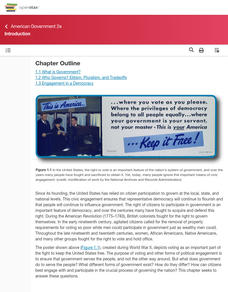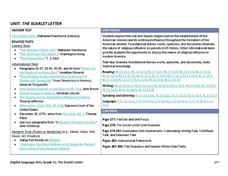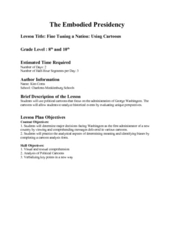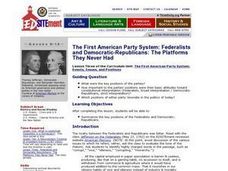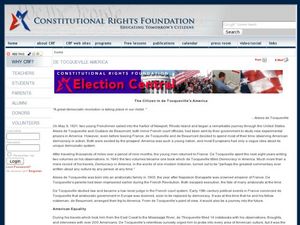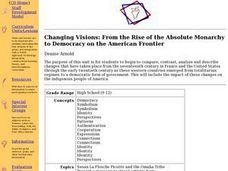Rice University
American Government 2e
An informative resource provides a textbook on American government that covers topics such as the definition of government and how democracy works. Each section provides brief questions at the end to assess scholars' understanding.
Museum of Tolerance
The Role of Citizens in a Participatory Democracy
Groups research participatory democracies and compare the role and rights of citizens in ancient history with those in recent U.S. history. Guided by a series of questions, individuals compose a persuasive essay in which they discuss the...
National Endowment for the Humanities
Walt Whitman to Langston Hughes: Poems for a Democracy
Explore the idea of democratic poetry. Upper graders read Walt Whitman, examining daguerreotypes, and compare Whitman to Langston Hughes. They describe aspects of Whitman's I Hear America Singing to Langston Hughes' Let America Be...
Curated OER
Demonstrating an Understanding the Evolution of Democracy in the United States
Students explore how democracy in the United States changed and evolved from its birth to the present. They participate in a mock testing environment. Students write a multi-tasked essay on American government and politics.
Annenberg Foundation
The New Nation
The conclusion of the American Revolution brought about a new conflict—choosing the stye of government for the newly formed United States. Using the views of both Federalists and Anti-Federalists, learners work in pairs and groups to...
National Endowment for the Humanities
The Power of the Majority over Thought
While Alexis de Tocqueville mourned a lack of "freedom of discussion" in America in the early republic, today's pupils are concerned about peer pressure. Using excerpts of de Tocqueville's writing and discussion questions, scholars...
Curated OER
African American Women Trailblazers
Students take a closer look at the accomplishments of African-American women. In this African-American history lesson plan, students explore the work of Bessie Coleman, Gwendolyn Bennett, Lulu Madison White, and Zelma Watson George as...
Louisiana Department of Education
The Scarlet Letter
Use Nathanial Hawthorne's immortal text on the influence of religion on the early American settlements, as well as its continued impact on American culture, with a unit that focuses on The Scarlet Letter. In addition to Hawthorne's...
Facing History and Ourselves
Taking Ownership of the Law
The work of building and maintaining a democracy is, in the words of Justice William Hastie, "never finished." To better understand what Hastie sees as an ongoing building process, class members listen to a seven-minute podcast about two...
Curated OER
The First Years of the Union (1797-1809)
In this online interactive history worksheet, students respond to 11 short answer and essay questions about the United States between 1797 and 1809. Students may check some of their answers on the interactive worksheet.
Curated OER
Fine Tuning a Nation: Using Cartoons
Students examine political cartoons to gain an understanding of the political issues that George Washington faced. For this historical perspectives lesson, students analyze political cartoons about the National Bank, the title...
Curated OER
Three Visions for African Americans
Students consider the plight of African Americans in post-Reconstruction America. In this African American history lesson, students discover the visions of African American leaders Booker T. Washington, W. E. B. Du Bois, and Marcus...
Chicago Historical Society
Are We the People?
Taking on the roles of a fiery Boston patriot, a Philadelphia merchant's wife, and a prominent abolitionist, your young historians will consider the reactions of these early Americans to the creation of the Declaration of Independence,...
Curated OER
Changes In The New Nation: New Beginnings
Students consider the role of American newspapers in the revolution and plans for new government. In this early American history lesson, students determine how communication provided by newspapers contributed to the organization of the...
National Endowment for the Humanities
Who Were the Foremothers of the Women's Suffrage and Equality Movements?
Young scholars complete a unit of lessons on the women who contributed to the early Women's Rights Movement in the U.S. They conduct Internet research, examine images online, develop a list of women, complete a worksheet, and create a...
Curated OER
The Federalist Defense of Diversity: Extending the Sphere
How did early Americans ensure expansion while also securing the rights of citizens? Alexander Hamilton and James Madison, two of our early leaders, considered the problem of faction to be the "mortal disease" that created unstable...
Curated OER
The First American Party System: Federalists and Democratic-Republicans: The Platforms They Never Had
Students investigate the beginnings of the political party system in the US. They determine the key positions of both the Federalists and the Democratic-Republicans. They compare the views of the early political parties with those of today.
Curated OER
Slavery and Empire 1440 - 1770
Students reflect on the events that led up to slavery in the early years of North America. For this United States History lesson, students read excerpts from the book "Out of Many," then gather in small groups to answer specific...
Teaching for Change
A Documents-Based Lesson on the Voting Rights Act
How did the Voting Rights Act affect the daily lives of American citizens? A document-based lesson developed by the Student Non-Violent Coordinating committee (SNCC) presents a case study of the impact of the Voting Rights Act of 1965 on...
Center for Civic Education
Citizenship Schools and Civic Education During the Civil Rights Movement and in the Present
Your young historians will discover the importance that citizenship education has played in the social progress of the United States as they learn about early efforts to discourage African Americans from voting in the 1960s.
Curated OER
The Citizen in de Tocqueville's America
Students explore democratic values. In this government systems lesson plan, students listen to their instructor lecture on Democracy in America by de Tocqueville. Students respond to discussion questions connected to the lecture.
Constitutional Rights Foundation
The Election of 1912
The Election of 1912: an election with four competitive opponents. Pupils get to know the candidates with informative reading passages that provide context to the election. Then, the class engages in a debate and answers questions as one...
Curated OER
From the Rise of the Absolute Monarchy to Democracy on the American Frontier
Students use a teacher-made museum guide with questions that allow them to analyze and compare the patron art of seventeenth-century France with portraits of later periods at the Joslyn Art Museum. Students also read The Little Prince...
National Endowment for the Humanities
David Walker vs. John Day: Two Nineteenth-Century Free Black Men
What was the most beneficial policy for nineteenth-century African Americans: to stay in the United States and work for freedom, or to immigrate to a new place and build a society elsewhere? Your young historians will construct an...


